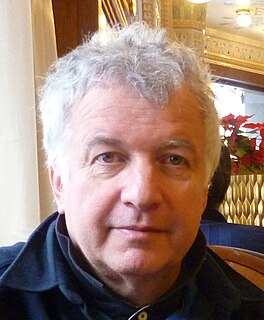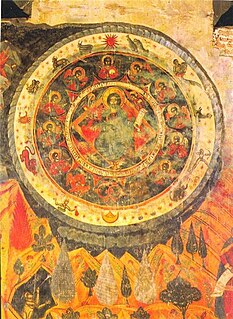Related Research Articles

Astrology is a pseudoscience that claims to divine information about human affairs and terrestrial events by studying the movements and relative positions of celestial objects. Astrology has been dated to at least the 2nd millennium BCE, and has its roots in calendrical systems used to predict seasonal shifts and to interpret celestial cycles as signs of divine communications. Many cultures have attached importance to astronomical events, and some—such as the Hindus, Chinese, and the Maya—developed elaborate systems for predicting terrestrial events from celestial observations. Western astrology, one of the oldest astrological systems still in use, can trace its roots to 19th–17th century BCE Mesopotamia, from where it spread to Ancient Greece, Rome, the Arab world and eventually Central and Western Europe. Contemporary Western astrology is often associated with systems of horoscopes that purport to explain aspects of a person's personality and predict significant events in their lives based on the positions of celestial objects; the majority of professional astrologers rely on such systems.
The Age of Aquarius, in astrology, is either the current or forthcoming astrological age, depending on the method of calculation. Astrologers maintain that an astrological age is a product of the earth's slow precessional rotation and lasts for 2,160 years, on average.

Astrological beliefs in correspondences between celestial observations and terrestrial events have influenced various aspects of human history, including world-views, language and many elements of social culture.
An astrological age is a time period in astrologic theology which astrologers claim parallels major changes in the development of Earth's inhabitants, particularly relating to culture, society, and politics. There are twelve astrological ages corresponding to the twelve zodiacal signs in western astrology. Advocates believe that when one cycle of the twelve astrological ages is completed, another cycle of twelve ages begins. The length of one cycle of twelve ages is 25,860 years.

Liz Greene is an American-British astrologer, psychologist and author. Her father was born in London, and her mother in the United States.
Jim Lewis was an astrologer, writer and entrepreneur. He is best known for pioneering the technique of Astrocartography.
Olivia Barclay was a British astrologer who played an important role in the revival of traditional forms of astrology in the late 20th century. Much of her focus in the latter part of her life was on the work of the 17th-century astrologer William Lilly.
Antiochus of Athens was an influential Hellenistic astrologer who flourished sometime between the late 1st and mid 2nd century AD. There is some disagreement as to when he lived and wrote. Franz Cumont and others have argued that he lived as early as the 1st century BC, while David Pingree placed him as late as the end of the 2nd century AD. The one agreed datum is that Antiochus is referenced by Porphyry, and so Antiochus must have lived before the death of Porphyry.

Guido Bonatti was an Italian mathematician, astronomer and astrologer, who was the most celebrated astrologer of the 13th century. Bonatti was advisor of Frederick II, Holy Roman Emperor, Ezzelino da Romano III, Guido Novello da Polenta and Guido I da Montefeltro. He also served the communal governments of Florence, Siena and Forlì. His employers were all Ghibellines, who were in conflict with the Guelphs, and all were excommunicated at some time or another. Bonatti's astrological reputation was also criticised in Dante's Divine Comedy, where he is depicted as residing in hell as punishment for his astrology.

Psychological astrology, or astropsychology, is the result of the cross-fertilisation of the fields of astrology with depth psychology, humanistic psychology and transpersonal psychology. There are several methods of analyzing the horoscope in the contemporary psychological astrology: the horoscope can be analysed through the archetypes within astrology or the analyses can be rooted in the psychological need and motivational theories. There might exist other astrological methods and approaches rooted in psychology. Astrologer and psychotherapist Glenn Perry characterises psychological astrology as "both a personality theory and a diagnostic tool".
Magnus Duncan Linklater, CBE is a Scottish journalist, writer, and former newspaper editor.

Sun sign astrology is the form of astrology most commonly found in many newspaper and magazine columns. It is a simplified system of astrology which considers only the position of the Sun at birth, which is said to be placed within one of the twelve zodiac signs. This sign is then called the sun sign or star sign of the person born in that twelfth-part of the year.

Nicholas Campion is a British astrologer and historian of astrology and cultural astronomy. He is the author of a number of books and currently pursues an academic career.
The Astrological Association is a British astrological organisation. The Astrological Association of Great Britain (AA) was formed in London on 21 June 1958. Its founding members, notably John Addey and Roy Firebrace, were members of the Astrological Lodge of the Thesosophical Society. John Addey later become President of the AA. The AA produces three publications - the Astrological Journal, published six times a year, Correlation, published biannually, and the Medical Astrology Newsletter. In 2002 the AA said their membership was "something over a thousand".

Jonathan Cainer was a British astrologer. He wrote astrological predictions six days a week for the Daily Mail, and forecasts for three Australian newspapers: the Sydney Daily Telegraph, the Melbourne Herald Sun, and the Perth Sunday Times. Cainer's predictions were also published in Hello, the Auckland Sunday News, the Botswana Echo, and Misty Magazine (Japan). It has been estimated that over twelve million people read his predictions.

Richard Harold Naylor, better known as R. H. Naylor, was a British astrologer, and the first sun sign astrologer. His horoscope of the newly-born Princess Margaret for the Sunday Express, led to a regular column that was soon copied by other British newspapers.

Hellenistic astrology is a tradition of horoscopic astrology that was developed and practiced in the late Hellenistic period in and around the Mediterranean region, especially in Egypt. The texts and technical terminology of this tradition of astrology were largely written in Greek. The tradition originated sometime around the late 2nd or early 1st century BCE, and then was practiced until the 6th or 7th century CE. This type of astrology is commonly referred to as "Hellenistic astrology" because it was developed in the late Hellenistic period, although it continued to be practiced for several centuries after the end of what historians usually classify as the Hellenistic era.
Locational astrology is any of various types of astrology that factor in specific locations of the Earth. The different types also carry a range of astrological techniques.

Astrology had small amounts of support in early Christianity, but support waned during the Middle Ages. Support for it grew again in the West during the Renaissance.

Robert Currey, is an astrologer and entrepreneur.
References
- ↑ Membery, York (29 August 2012). "Horoscopes: Tales of the expected". Daily Express . Retrieved 6 October 2014.
- ↑ Dr Nicholas Campion (1 September 2012). Astrology and Popular Religion in the Modern West: Prophecy, Cosmology and the New Age Movement. Ashgate Publishing, Ltd. pp. 298–299. ISBN 978-1-4094-6149-4.
- ↑ "Interview with Nick Campion - Part 2". Astrological Association. Archived from the original on 14 October 2014. Retrieved 6 October 2014.